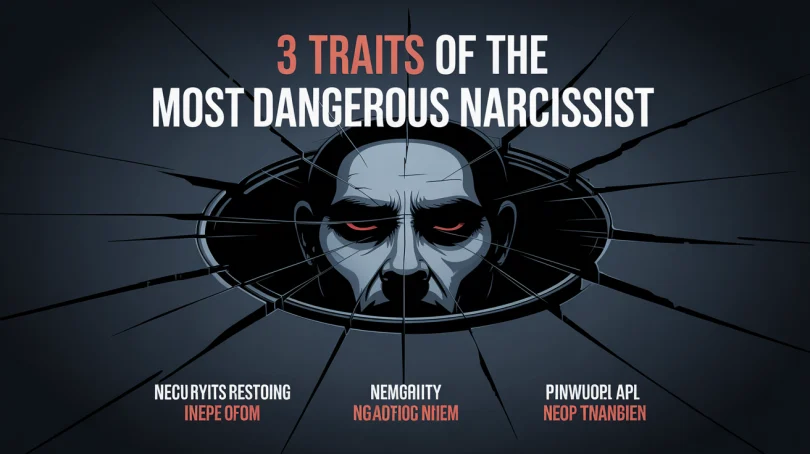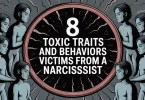Some narcissists crave power, others seek admiration, but there’s one type that doesn’t care about either, and that makes them the most dangerous of all. They don’t follow the usual patterns or fit the typical signs, and when they feel rejected, their response isn’t just manipulation, it’s destruction.
In this article, I’ll show you how to recognize the most dangerous type of narcissist, the chaotic cycle they trap you in, and what you need to do to protect yourself before it’s too late.
The Most Dangerous Narcissist
Most people assume that the most dangerous narcissists are loud, arrogant, and openly cruel. But the real threat lies with those who don’t seem dangerous. If you’ve ever met someone who appeared deep, introspective, or even a little broken in a way that made you want to root for them, you’ve likely encountered this type.
They don’t come across as grandiose or arrogant. Instead, they pull you in, presenting themselves as underdog people who have suffered and just need someone who understands.
At first, you might love how open they seem, how deeply they appear to feel things. They form connections fast, but it doesn’t feel concerning initially; it feels like they truly get you, like you’ve met someone who sees the world the way you do. Then, slowly, things stop making sense. You take too long to text back one day, and suddenly they’re devastated.
You say the wrong thing, and instead of brushing it off, they’re in full meltdown mode. Their reactions are so intense, so bizarre, that your first instinct is to think, “This can’t be real. Maybe they’re joking or just being dramatic.” Because who reacts like this?
Yet, for as sensitive as they seem, they don’t hesitate to turn on people the moment they feel slighted. Every ex betrayed them, every friend abandoned them, every boss mistreated them. The way they talk about these people isn’t just disappointment it’s seething resentment that never fades.
What you’re seeing is not just a covert narcissist; it’s something more complex: a mix of narcissistic, borderline, and antisocial malignant traits, shifting depending on what serves them in the moment. At their core, they’re still a covert narcissist, seeking validation and control through pity and reassurance.
They target empathetic, responsible people who feel compelled to care for others, pulling them in by appearing wounded and fragile. As long as you’re serving their needs, they seem gentle, even caring. But when they stop getting what they want, they don’t just sulk or guilt-trip, they snap.
That’s where you start to see the borderline traits. If you’re unfamiliar with borderline tendencies, the core issue is emotional instability: rapid mood swings, extreme reactions, and a deep fear of abandonment. They don’t just get upset; they feel everything at full intensity.
One moment, they’re adoring you; the next, something trivial happens, and you’re the villain, the betrayer, the person hurting them on purpose. This is when you start walking on eggshells. One wrong word, one forgotten text, and they either fall apart or explode.
Their emotions swing between rage, despair, and overwhelming neediness, acting impulsively in ways they’ll later deny or regret. There’s no middle ground, only extremes of idolization or punishment.
If their meltdowns don’t pull you back in, they switch again, this time to cruelty, vengeance, and aggression. If they feel rejected, they don’t let go; they fixate, obsess, and escalate, seeking to ruin you. They’ll destroy reputations, sabotage careers, and turn your friends and family against you. This is what makes them the most dangerous type of narcissist: they don’t fit neatly into one category because they exist on a continuum, swinging between extremes.
On one end, they’re hyper-needy, emotionally volatile, and terrified of abandonment. They cling, panic, and break down at the slightest hint of rejection, desperate to pull you back in.
But when that fails, they swing to the other extreme: hyper-vindictive, explosively vengeful, and out for destruction. It’s an obsessive need to punish and lash out in ways that feel erratic, uncontrollable, and impossible to predict.
At their core, you’re still dealing with a covert narcissist driven by a need for reassurance, pity, and unwavering devotion. They want you to be their rock and their savior. The moment they sense you pulling away, they spiral, gripping tighter, lashing out harder. And when you try to escape, they make sure you regret it.
The Cycle of Chaos
Narcissistic relationships follow a predictable pattern: idealization, devaluation, and discard. But with this type of covert narcissist, the shift feels chaotic, irrational, emotional, and impossible to anticipate. Yet, beneath the turmoil, there are patterns, subtle shifts in behavior and emotional intensity that, once understood, reveal what’s happening.
Idealization
Idealization is where the narcissist builds you up, making you feel important, valued, and deeply understood. But with this malignant covert narcissist, it’s more than admiration, it’s emotional fusion. They need you to feel like you’re part of them. Because they need you, you feel safe, like they’ll never leave. For those who’ve been used or hurt before, this feels unshakable, like finally being chosen.
Devaluation
Devaluation is where the relationship becomes unstable, and the sense of security unravels. The warmth and closeness that were once felt are replaced with tension, frustration, and unpredictable reactions. Instead of feeling appreciated, you start to feel like you’re constantly falling short, like nothing you do is ever enough.
With this malignant covert narcissist, devaluation is different; it’s not just contempt or passive withdrawal; it’s chaotic, aggressive, and demanding. You’re not just devalued; you’re treated as if you’re broken and need to be fixed. To them, you’re an appliance that won’t function properly, so they bang on it, shake it, and push it harder, desperate to make it work the way they want.
This is where their borderline instability collides with their narcissistic entitlement. They hate that you’re not who they need you to be, and they hate that they’re afraid to lose you. Every reaction is too big, too emotional, too demanding. They push, demand, and explode over things that make no sense, leaving you scrambling to meet their impossible expectations. The more they fear abandonment, the more erratic and aggressive they become.
Discard
Discard is usually the phase where the narcissist moves on, leaving behind the person they once built up. The attachment disappears, replaced by indifference or contempt. Someone who was once their priority becomes insignificant, ignored, or discarded without a second thought.
But for the malignant covert narcissist, discard isn’t about moving on; it’s about trapping you. They no longer want you, but they won’t let you go. You’re not discarded; you’re kept close enough to punish. They want to break you down, make you regret ever disappointing them, and keep you locked in a cycle where you’re too afraid or exhausted to escape. Any attempt to pull away only fuels their need for control, and the more you try to leave, the harder they fight to keep you stuck.
This is where their rage reaches its peak: full-on character assassination, sabotage, financial ruin, nothing is off-limits. They might turn violent, issue threats, or smear your name until you’re unrecognizable. They’ll turn your friends and family against you, poison your reputation, and create chaos wherever they can. This isn’t just rejection, it’s destruction.
Tools for Empowerment
Escaping a malignant covert narcissist isn’t as simple as walking away. If you’ve been in this dynamic, I am so sorry. Healing starts when you realize that your well-being, your freedom, and your life are worth fighting for. But breaking free doesn’t happen overnight. If you leave too soon or too suddenly without a plan, you could put yourself in real danger. With this type of narcissist, no contact is seen as the ultimate threat, and they will retaliate. So, you need a plan.
Step 1: Stop Sharing Information
Don’t let them see what matters to you, because the moment they do, they’ll use it against you. If they sense you pulling away, they’ll escalate with guilt, threats, or manufactured crises. Expect it, prepare for it, and don’t let it pull you back in.
Step 2: Set Boundaries Quietly
Set boundaries without announcing them. Boundaries won’t change them, but they’ll protect you. Start small: respond less, give shorter answers, and create space where you can. If they notice a sudden shift, they’ll push harder, so move slowly to avoid detection.
Step 3: Secure Your Exit
If you depend on them financially, start saving. If you share children, document everything. If they control your social circle, rebuild support quietly. If you’re at risk of legal or financial attacks, get ahead of them before they notice. The goal isn’t just to leave it’s to be protected before they realize you’re gone.
I know this because I’ve lived it. Staying isn’t safe either. With them, every conversation is manipulation, every interaction a test of submission. If they sense you slipping away, they’ll work to break you down and ensure you never leave. There is no peace, only control. Yes, leaving is difficult, but staying is even harder. There’s no easy way out, but there is a way forward. It won’t be fast or simple, but every step away is a step toward clarity, strength, and peace.
It might feel impossible now, but one day, you’ll look back and realize that the hardest thing you ever did was also the thing that saved you. That freedom is worth everything.







Leave a Comment